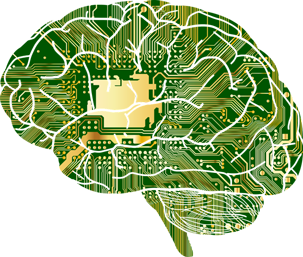What Is ML & AI?
In recent years these two terms have been used interchangeably to describe how machines mimic human intelligence and responses. Even though there are many similarities and overlap between the two terms and technologies, and this is why quite often people use these two terms interchangeably, there are also quite a few and important differences between the two.
On a broad level, Artificial Intelligence (AI) is the overarching concept of using computers that can imitate human intelligence. Machine Learning (ML) is an application or subset of AI that allows machines to learn from data without being programmed explicitly.
A good example to showcase the difference between the two would be the basic chatbots vs the most advanced chatbots or virtual assistants we see these days in most websites. The basic chatbots are designed to recognize and respond to customer questions using a set of predefined rules, using a type of basic AI. Machine Learning is a bit more complex and takes this problem solving to the next level.
When ML is involved these more advanced chatbots are now "learning" on their own - without a programmer feeding them with predefined information - and they continually improve and adapt their responses based on new data provided by the users.
History Of AI
The idea of AI is not something new. Our ability to imagine artificial intelligence goes back to the ancient times. The earliest themes of AI, robots, and self-moving and learning objects go back to Ancient Greece and appear in the works of the Ancient Greek poet Hesiod (circa 700 BCE) who relates the story of Talos, some kind of a "robot" built by god Hephaestus to protect the Greek island of Crete from invaders. AI appears in the mythology of other ancient people as well as there are myths of artificial life and AI in Chinese, Hindu, Egyptian and other cultures.

AI And ML In Modern Times
In modern times, the birth of AI as a research field and academic discipline was born in 1956 on the assumption that human intelligence "can be so precisely described that a machine can be made to simulate it". This quote is a fair definition of modern AI too, which is the overarching technology that makes a computer system mimic human intelligence.
ML is a subset of AI which allows a computer system to automatically learn, without direct instruction, using algorithms to identify patterns within past data. Those patterns are then used to create a data model that can make predictions.
Today, AI and ML is at the heart of many technologies we use, from smart devices and voice assistants such as Siri and Alexa, to chatbots, Facebook's auto friend tagging suggestions, and Google's search algorithms.
Companies in various industries use AI and ML in several ways. In banking they use it to detect and prevent fraud and cybersecurity attacks, in Health Care they use it to analyze patients data and provide clinical decision support and automated insights, in Customer Service AI can be used in the form of chatbots to answer questions, gauge customer intent and provide virtual assistance, in Retail it can help retailers analyze their users' buying patterns and based on this provide them with personalized offers and pricing and enhance their customer experience.

In our world, the world of digital solutions, web development and marketing automation, AI and ML can provide users and companies with a number of important benefits.
From a user's standpoint, it can enhance user/customer experience by providing users with targeted content, adaptive interfaces, online chatbot support, and personalized shopping experiences.
From a corporation's perspective, it can uncover patterns within data which can help decision makers identify the story the data is telling. It can help identify customer behaviour based on analysis of collected data letting companies optimize product or information recommendations towards their clients, and provide them with a better customer experience. It can also significantly lower costs by freeing up time and resources and allowing companies to shift their teams' focus on what matters most.
What's Next?
In the next post (Part 2) of this "AI and Machine Learning" series we'll explore what is the Coveo Machine Learning service (Coveo ML), and what it can do.




